

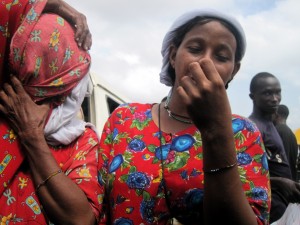
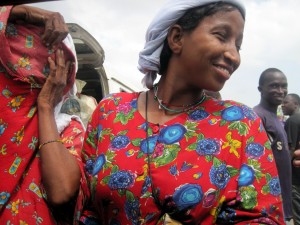



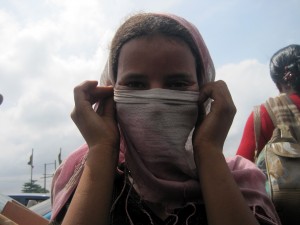
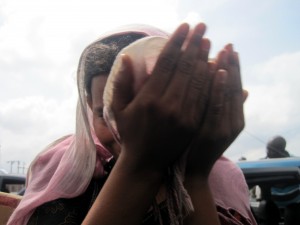
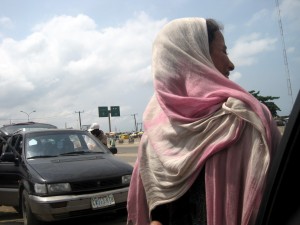 These girls can be found all over West Africa, sometimes with little children on their backs. They live on the move, and make a living by begging for money. At the corner of streets you can find their fathers and sometimes husbands, silent and with turbaned heads. The men don’t usually beg, and I doubt that people give them money. The women do however, old and young, without shame. They are multilingual, speaking Hausa, sometimes French, Arabic, and the language of the city in which they live. Most people actually give them money not because of their state but because of their language dexterity. They are not poor, nor diseased. Their conditions are even beyond just being lazy. They are conditioned by a nomadic culture into a life of hedonism. They are nomads.
These girls can be found all over West Africa, sometimes with little children on their backs. They live on the move, and make a living by begging for money. At the corner of streets you can find their fathers and sometimes husbands, silent and with turbaned heads. The men don’t usually beg, and I doubt that people give them money. The women do however, old and young, without shame. They are multilingual, speaking Hausa, sometimes French, Arabic, and the language of the city in which they live. Most people actually give them money not because of their state but because of their language dexterity. They are not poor, nor diseased. Their conditions are even beyond just being lazy. They are conditioned by a nomadic culture into a life of hedonism. They are nomads.
This girl’s name is Aisha. She’s from Niger, the country on Nigeria’s border to the North. The other girls are her sisters, and all they do is beg for money from travellers. They do so with dignity. They are cheerful and friendly. And tough. No school. No work. Just begging, and sometimes occasional “unwanted” pregnancies. They live tough street lives and are thus exposed to much abuse.
1
solomonsydelle at http://www.nigeriancuriosity.com
“They are not poor, nor diseased. Their conditions are even beyond just being lazy. They are conditioned by a nomadic culture into a life of hedonism.”
Can’t help but get the impression that you are blaming these girls for their ‘condition’. Please correct me if I am wrong.
I have to say that I wish people did not have to beg and I wish that there wasn’t a cultural attitude that encouraged and condoned begging as a means to financial ends. Unfortunately, that is indeed the case, particularly for nomads who leave their impoverished homes/villages to beg in Nigeria’s cities. If those girls and others like them are impoverished and uneducated, it’s our fault. If they end up with unwanted pregnancies, it’s also our collective fault. Granted their culture is different and I disagree with certain things about it, but ‘we’ could tackle the problem by requiring/encouraging education, providing jobs and other options to keep some if not all beggars off the street and protecting the disadvantaged. Seems like a lot, but others have done it, so we could at least try.
Anyway, how are things? I do have to say the pictures were well shot. Off to see if there are other pics from your trip. You really should turn them into a picture book of sorts. That would be very nice.
Posted at July 2, 2010 on 2:23pm.
2
Kola at http://www.ktravula.com
Thank you for the thoughtful comments.
I have thought long and hard for years about why we have these folks on the streets, and I haven’t found the right answers. Here’s why:
They are usually very healthy. Most other beggars are either crippled or disabled in some way. These girls (and they are always girls and women) are not. Their parents encourage them to beg rather than go to school or learn a trade. I have been long interested in their motivations but I’ve never succeeded. They seem to enjoy it, like a normal way of life, but I could be wrong. The girls are not to blame, but their parents and their communities surely are.
Yes, there could be something done about it, but what, precisely? Can we really change them? Do we need to? They come from a neighbouring country. Should we gather them all and put them in boarding houses in Nigeria, giving them Western education by force, or send them back to Niger? And we still haven’t looked at the fact that they might actually be resentful of (our Western-style) education.
I’d like to have your suggestions.
Posted at July 3, 2010 on 3:17am.
3
Abi Idowu at http://abidowu.vpweb.co.uk
Many years back, my mum offered one of these girls work (granted , it was as a paid domestic help but the added ‘bonus’ of going to school or learning a trade was thrown in). The disdain with which she looked at my mum and then her mother came and started raining abuses on my mum about her wanting to ‘spoil’ her daughter’s life.
While this may not be the norm, it has ( I confess) influenced the non sympathetic stance I have to them. Many Nigerian northerners were nomads but they still worked, selling fura de nono, wara (local cheese) and their men being leather and rubber repair men, so frankly, for me, I don’t think they have an excuse.
Posted at July 12, 2010 on 8:52am.
4
Kola at http://www.ktravula.com
Well, they are nomads. I’ve had a few conversations with people who are smarter than me on these matters and one thing I’ve learnt is that it is not only impossible, it is useless trying to change them. It’s not really that they are poor, they’re just like us, but their nomadic culture has conditioned them to this kind of lifestyle which I’ve realized is not at all easy either. They can’t help themselves. They don’t want to help themselves. They just want to live, just as they have always done, on the move, free of constraints of society.
My decision to do a post on them is really not to elicit sympathy or “help” for them as to generate discussion. They are who they are, and I have a sneaky feeling that they consider themselves of a superior species than other members of the society from whom they beg for money.
Posted at July 12, 2010 on 9:13am.
5
Abi Idowu at http://abidowu.vpweb.co.uk
About that feeling of superiority, I agree.
Posted at July 16, 2010 on 7:03am.